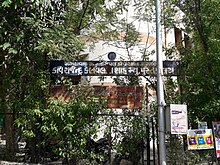Rajendra Shah | |
|---|---|
 | |
| Born | 28 January 1913 Kapadvanj, Bombay Presidency, British India |
| Died | 2 January 2010 (aged 96) Mumbai, Maharashtra, India |
| Occupation | Author |
| Nationality | Indian |
| Alma mater | MSU Baroda |
| Period | 1947-2003 |
| Notable works |
|
| Notable awards |
|
Rajendra Keshavlal Shah (28 January 1913 – 2 January 2010) was a lyrical poet who wrote in Gujarati. Born in Kapadvanj, he authored more than 20 collections of poems and songs, mainly on the themes of the beauty of nature, and about the everyday lives of indigenous peoples and fisherfolk communities. In his poems using Sanskrit metrics, he was influenced by Rabindranath Tagore. He is considered one of the giants of post Gandhi-era in Gujarati literature.[1]
Among his various professions, Shah was also a publisher in Mumbai, where he launched the poetry magazine Kavilok in 1957.[2] The press itself became an important Sunday meeting-place for Gujarati poets. Apart from writing poetry, Shah also translated into Gujarati Tagore's poetry collection Balaaka; Jayadeva's Gita Govinda; Coleridge's The Rime of the Ancient Mariner; and Dante's The Divine Comedy.[3]
Shah won the Jnanpith Award for 2001.
